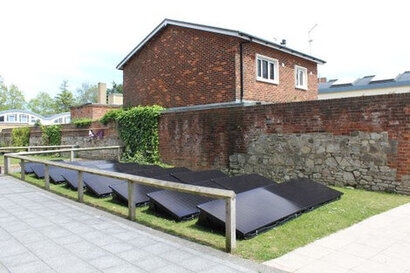
The project is part of SOLARISE, a 4.18 million euros European project to facilitate the broad roll-out of new solar energy and storage technologies funded by Interreg 2 Seas and the European Regional Development Fund.
Solar photovoltaic panels have been installed next to the Port-Eco House, a three-bedroom property used for research into the energy efficiency and building performance of houses. A smart Tesla Powerwall battery has also been installed in the house, which allows excess electricity generated by the panels to be stored for later use.
Based in a former caretaker's lodge on campus, the Port-Eco House is used to conduct pioneering research into the physical and environmental performance of dwellings, including human interaction with the property.
The house’s solar panels are being individually monitored, while the battery provides monitoring of the overall solar energy production, building load and input/export of electricity.
Three Tesla Powerwall batteries have also been fitted at the University’s Future Technology Centre (FTC), a facility for engineering students and staff to explore today’s new and emerging technologies. The building was already equipped with rooftop solar panels and photovoltaic windows. Spanning five floors, the FTC has achieved the BREEAM 'Excellent' rating for environmental sustainability from the National Building Specification.
When fully charged, the batteries can become the building’s sole electricity source for up to four hours. They can also capture and store excess electricity generated by the solar panels during the day, which can be used in the evenings or during poor weather. The Tesla batteries will also provide monitoring of solar generation and other key power flows within the building’s electrical network, which powers lighting, computers and workshop machinery.
“With the combined work of the solar photovoltaic panels and the Tesla battery, the University’s Eco House has become mostly self-sufficient in terms of its electricity consumption, which is around 10 kWh per day” said Professor of Power Systems Engineering, Victor Becerra. “At any given time, the electricity consumption of the house is being supplied by either the panels, the battery, or both, with any excess energy generated by the panels being stored in the battery, and with only very occasional import from the external electricity supply. In the case of the Port-Eco house, the batteries are able to provide backup functionality in the event of an unexpected power cut. They can also take additional charge as a precautionary manner ahead of a forecasted lightning storm affecting the area, which increases the likelihood of an outage. In periods when there is less solar energy available, in winter for example, it is also possible to charge the batteries with cheap off-peak electricity, usually at night, for use at peak times when electricity can be significantly more expensive.”
The monitoring data collected by the solar living lab will be correlated with data from weather stations already in place at the university. Together, all these data streams will enable research into various aspects of solar photovoltaic energy, including the synergy between solar power generation and energy storage, the efficiency of solar photovoltaic panels and mechanisms to enhance it, the effect of shade, weather and other environmental variables on solar power generation, and the techno-economic modelling of solar energy systems, among many others.
“Solar energy is the most abundant of all renewable energy sources” added Professor Becerra. “It is a free and clean energy source and its use is rapidly growing around the world. Installing solar panels and batteries on campus aligns with the University’s ambitions to become a climate-positive institution by 2030 and also allows us to research solar power and battery storage technologies”.
The solar living lab will be used by PhD students for their research, and will support the training and projects of Master’s and undergraduate students at the School of Energy and Electronic Engineering and elsewhere in the Faculty of Technology. Students in the new MEng/BEng (Hons) Electrical and Renewable Energy Engineering will particularly benefit from this facility.
For additional information:

